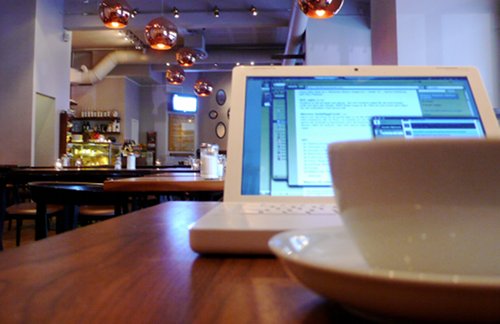Blog posts tagged Wi-Fi
Friday Donut tip: finding alternative places to work

Do you get to work somewhere like this? (Image: plindberg on Flickr.)
Looking back, some recent IT Donut blog posts sound a little doom laden. We've had mobile phone meltdown, password breaches and even questions about whether you can trust your own employees. It's not that we're paranoid (honest). We just like to think about how to cope in the worst case scenario.
Continuing in the same vein (sorry about that), if there's a serious problem with your business IT - or a disaster that affects your entire premises, like a fire or a flood - then your business continuity plan might encourage you to go and work from somewhere else.
Working from home can be a good option, but these days there are other possibilities too. Free Wi-Fi must surely be available in every town in the UK by now, so here are three ways to find a public place - like a cafe or bar - to work from:
- Check the listings on WorkSnug. WorkSnug is an online tool to help mobile workers find places to work from. Its claim that work is 'not a place we go, it’s a thing we do' might be a little ahead of its time, but it has a tip-top list of places with fast, free Wi-Fi where patrons won't start tutting if you open your laptop. Just tap your postcode into the search and see what comes up.
- Look for a chain. All the best mobile worker friendly cafes and bars I know are independents. I don't why that is - they just are. But if you need free Wi-Fi and you need it fast, head for a chain on the local High Street. Pret a Manger, Cafe Nero, Starbucks and even McDonald's all offer free wireless internet. Busy branches might not be the best places to focus on work, but they're great for catching up on email.
- Use a dongle. You want real freedom to work anywhere? You'll need a mobile broadband dongle. These look just like memory sticks, but contain a mobile phone SIM card. When you plug one into your laptop, they get you online via a 3G mobile phone network. As long as there's mobile coverage, you can get on the internet. Just watch the costs - you usually pay for the amount of data you download.
Do you work from public spaces? How do you find your favourite spots?
Previous Friday Donut tips:
Do we really need Wi-Fi on the Tube?
 News came this week that much-mooted plans for wireless internet access on London’s Underground are going full steam ahead in time for the Olympics.
News came this week that much-mooted plans for wireless internet access on London’s Underground are going full steam ahead in time for the Olympics.
Passengers at over 80 Tube stations will be able to log on while moving through stations and waiting for their trains.
On the face of it, this is A Good Thing. For a start, long-suffering commuters will be pleased they can check the exact reason for the delay on their smart phone or even fire off a complaint to Boris Johnson while stood shoulder-to-shoulder on the platform.
You’ll also be able to email your client if you’re running late for an important meeting with them or grab a map of your destination while on the escalator instead of having to wait till you’re back on the surface. If the connection is good enough, making calls via voice over IP services like Skype could be possible.
On the downside, I’m predicting an increase in the number of accidents on escalators as people check their tweets rather than watching where they’re going. We could even see the odd person attempting to use their full-size laptop on the platform.
(If you think that sounds farfetched, my experience suggests otherwise: I once saw a man playing a game of online poker on his laptop while simultaneously negotiating the ticket barriers and escalators at Reading Station, so anything’s possible.)
When is enough enough?
But as faster internet connections seep into every area of our lives, do we need to start guarding those precious moments when we’re cut off? Should we treasure those increasingly rare minutes when we’re out of signal, offline and unlikely to be disturbed by a buzz in our pocket or someone else’s loud Nokia ringtone? (Watch the video up to the 1:20 mark to make it worthwhile.)
I’m honestly in two minds about this. On the one hand, wireless internet has transformed the way many of us work. Within the office it’s brought extra flexibility to how we conduct meetings and work with colleagues. In the wider world, it’s this technology that enables us to stop for a coffee and catch up on email or get online even when we’re travelling.
But the flipside is that it’s much harder for us to switch off. Queuing in Starbucks? You’re much more likely to check your email or review your tweets than just stopping to look around you.
On the train? Never mind sitting there quietly to collect your thoughts or getting stuck into reading a complex document. With wireless internet available on many UK services, you’re more likely to get distracted by Facebook or spend the time dealing with email overload.
The tables will turn
Currently, losing internet access can be a frustrating experience. But we’re slowly but surely moving towards a world where you can stay connected everywhere.
So, once internet access has crept into every rural blackspot, once every plane has Wi-Fi and once underground trains pose no barrier to getting online (like in Tokyo), will we start to yearn for a place where we can be disconnected? Will the frustration of getting cut-off unexpectedly be replaced by the frustration of being always reachable?
Well, it’s maybe not that clear-cut. But we’re certainly going to have to learn more self-discipline and understand when unplugging ourselves is a good idea: whether it’s to focus on getting a task done or simply to find time and space to think.



